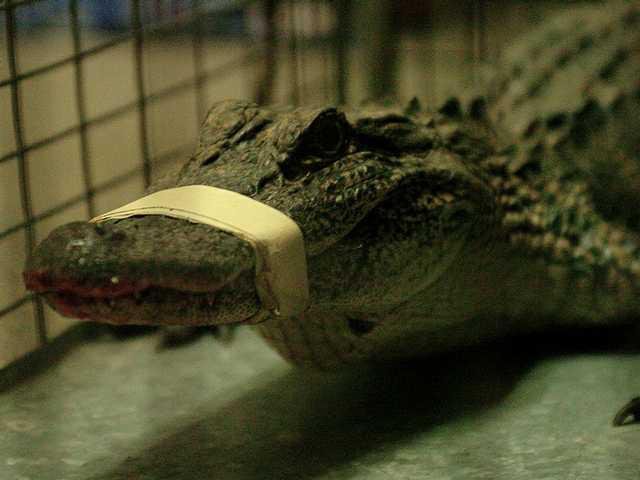Lake Lanier's only little alligator sat in limbo in an office of the Georgia Department of Natural Resources regional office Friday, waiting to find out where he will go as officials pondered where he came from.
The alligator is temporarily being housed in a kennel cage with his jaws taped shut until DNR can transport him to a more suitable habitat with other alligators, likely south of the Fall Line, which runs roughly from Columbus to Macon to Augusta.
The alligator, caught Thursday night by a DNR employee, has been causing a stir on the lake for about a month as many spotted him but no one could seem to catch him.
"Someone called our 800 number and reported he was in their pasture," said Ken Riddleberger, region supervisor. "We're pretty sure that's him. He's the sole alligator population of Lake Lanier."
Riddleberger, who earlier assumed it was released into the lake by humans, now is not so sure how the 3-foot-long gator made its way to North Georgia.
"We thought initially someone had it as an illegal pet; I don't think he came up on his own power," Riddleberger said. "Now I wonder if he did. It's acting very much like a wild alligator. It doesn't show any signs of being acclimated to people."
The alligator is an American Alligator, which is native to many parts of South Georgia and also thrives in areas such as Macon and Augusta, Riddleberger said.
But alligators do not naturally live in North Georgia because the winters here are too cold.
"Up here, they're just out of place. We didn't know it would survive the winter," Riddleberger said.
But the Lake Lanier alligator appears healthy, and Riddleberger said he should be fine once he is released into the wild.
"He looks pretty healthy. Hitting the cage is his biggest problem right now," Riddleberger said. "The less we handle him the better it's going to be."
The wild alligator hisses and lunges at people looking through the bars, and its snout was raw and bloody Friday from hitting the cage.
Riddleberger said the alligator will likely be transported to its new habitat by today.
Alligators are reptiles and do not need to be in the water to survive. They eat everything from fish to birds to snakes, Riddleberger said.
The DNR emphasized the importance of leaving wild animals alone. Feeding wild animals like alligators and bears will make them associate humans with food, making them more likely to approach humans when they would naturally stay away, Riddleberger said.
It is also illegal to keep wild pets in Georgia, and if someone had been keeping this alligator as a pet, releasing it into the lake would have been illegal too.
Riddleberger said he can only recall one other instance of an alligator caught in Lake Lanier, which he estimated to be around 15 years ago.
And though this alligator is small, many will surely be glad to know that he is no longer roaming the lake.
"He's not as exciting as Bigfoot, but he is real," Riddleberger said.

